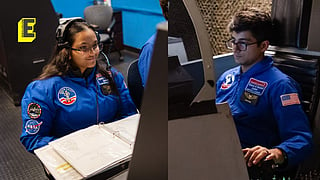
More than 250 high school students from 46 countries participated in the Honeywell Leadership Challenge Academy (HLCA) at the US Space and Rocket Center, Home of Space Camp® in Huntsville, Alabama.
Ranvir Verma and Rishika Iyer share their journey.
Rishika:
Looking up at the night sky as a child, trying to map out constellations, I never imagined I'd one day train like an astronaut. My journey with science started early — my parents always made sure I had books about space, the human body, rockets, and plants. That early exposure sparked a curiosity that would eventually lead me to the Honeywell Leadership Challenge Academy (HLCA).
When I received my acceptance letter, I felt a mix of excitement and nervousness. This would be my first time traveling alone, staying away from family, and meeting people from across the globe, but my love for astronomy and space made me look forward to the opportunity with anticipation.
Ranvir:
Like Rishika, my fascination with stars and galaxies started young. I've always wanted to understand more about the cosmos, which naturally drew me toward STEM subjects. When I learned about my selection for HLCA, I could barely contain my excitement. This wasn't just another program – this was a chance to see rockets and use simulators up close. As I told my friends, "It's the real deal!"
Rishika:
Our days were intense but incredible. From 6 AM wake-up calls to 9:45 PM lights out, every moment was packed with learning and discovery. The shuttle mission challenged me the most. Being in mission control, coordinating with crew members in a different area, and solving problems under time pressure — it tested every skill I had and taught me many new ones.
I even faced my fear of heights during rock climbing. Making it to a decent height felt exhilarating! The most memorable skill I learnt was soldering. After hearing my mother talk about it for years, finally trying it myself was both daunting and, eventually, deeply satisfying.
Ranvir:
Every activity pushed us out of our comfort zones. The F-18 flight simulator was my absolute favorite — as someone who loves airplanes and dreams of flying one someday, this experience was priceless. The gravity chair was equally thrilling, giving us a taste of what astronauts experience. Working with the Raspberry Pi and learning Python coding opened up a whole new world of possibilities.
Rishika:
One of the most beautiful aspects of HLCA was meeting students from different countries. Despite our varied backgrounds, our shared passion for science united us. We spent hours discussing how education systems differ across countries, sharing stories about our cultures, and building friendships that I know will last a lifetime.
Ranvir:
Initially, I was apprehensive about traveling alone and meeting new people. But those worries disappeared quickly. Despite our different cultures and languages, we found common ground everywhere — in our love for science, our curiosity about space, and our shared experiences at the camp. The post-session conversations and game nights became some of my favorite memories.
Rishika:
HLCA gave me more than just technical knowledge. The confidence I gained along with leadership skills, presentation skills and teamwork will help me in any path I choose. The activities and discussions with teammates, the triumph of completing challenging simulations, and the friendships we formed — these experiences have shaped my personal growth.
Ranvir:
This experience has helped me build a broader perspective on both my academic and personal goals. I'm now more confident in problem-solving and have a clearer vision of my future in aerospace. Beyond the technical skills, I learned how to connect with people across cultural boundaries and work effectively in diverse teams.
Together, we discovered that HLCA is more than just a space camp — it's where future leaders are born, where international friendships blossom, and where dreams take flight. Our journey from stargasing children to HLCA experience has shown us that with passion and determination, the sky isn't the limit — it's just the beginning.
